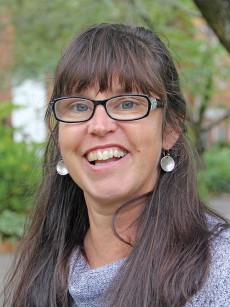 Social Sciences
Social Sciences
Climate Crisis: Everywhere and Nowhere

It’s been a vexing question for Kari Norgaard: How can the crisis of climate change simultaneously affect the entire world and yet fail to make the evening news?
How can the impact of climate change be, as she puts it, “everywhere and nowhere”?
Her research shows that this paradox feeds off a host of intersecting factors: geopolitics, economics, cultural expectations—even how we see ourselves.
Norgaard (pictured), a UO sociologist, is investigating why we, as a species, seem incapable of coming to terms with this human-caused global crisis. Her body of work includes the critically acclaimed 2011 book, Living in Denial: Climate Change, Emotions and Everyday Life, a case study of one Norwegian community’s detachment from the stark reminders of a warming world, evidenced for example in a first snowfall that came two months later than usual.
Norgaard found that global warming was common knowledge among the highly educated and politically savvy Norwegians in her case study. But they were inclined to shift responsibility for the problem to the US or China. “They say, ‘We’re a small country, we’re not as bad as the Americans,’” Norgaard said.
By laying the blame elsewhere, Norgaard’s subjects were protecting the things that are important to them—a gas-guzzling SUV, perhaps. Her work has also shown that where climate change is concerned, people struggle with feelings of hopelessness, given the enormity of the issue, and feelings of guilt—for failing to make fundamental lifestyle changes.
Said one woman interviewed by Norgaard: “I have a guilty conscience, that’s why I try not to think about it.”
Unfortunately, this is a self-fulfilling prophecy. If people don’t hear their friends and neighbors talking about climate change, they’re less likely to bring the matter up themselves, Norgaard said.
“My research is focused on the people who know it’s happening—it’s about denial in the form of apathy,” she added.
But while many think of climate change in terms of “What should I be doing differently?,” Norgaard stresses that to solve this global problem, it is our political leaders who must change course.
“The response we need is not about riding bikes or changing a light bulb, it’s about reengaging democracy,” Norgaard said. “What individual people can do is talk about climate change, care about it, demand political action.”
Tackling this massive and politically charged issue has earned Norgaard no shortage of venom from skeptics. Rush Limbaugh denounced Norgaard as an “environmentalist wacko” in a 2011 tirade and she has been attacked in YouTube videos, as well.
Norgaard pays little attention to the denial movement, beyond noting that its most serious threat is in distracting the rest of us from acting responsibly. But she expects the clamor from critics to die down over time.
“As climate change becomes more obvious,” Norgaard said, “that’s going to go away.”
In just the last year or so, Norgaard has been buoyed by indications that climate-change policy might finally be moving to center stage. President Obama and Chinese president Xi Jinping recently signed a historic agreement to cut emissions. There is more news coverage and more civic action, she said, noting for example that some 400,000 people joined in a march last fall in New York City, demanding government action.
“There is so much climate activism now,” she added. “The problem is extremely serious and things do not look good. However, in the last year it is very energizing to me that there are more people talking about it.”
—Matt Cooper
Photo: Matt Cooper


 Twitter
Twitter Facebook
Facebook Forward
Forward